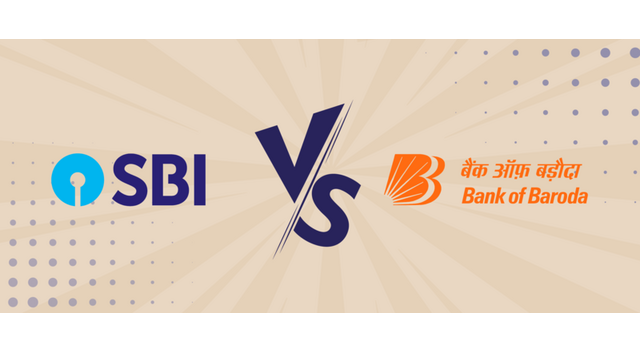The State Bank of India (SBI) and Bank of Baroda are the two biggest names in Indian public sector banking. Both have long histories and play important roles in the Indian economy. They are both prestigious organizations. Selecting between the stocks of these two PSUs requires careful consideration of various factors. In this blog, we will determine which one is better among SBI and BOB.
About State Bank of India (SBI)
The State Bank of India (SBI) is the biggest public sector bank in India with a strong domestic and global footprint.
It has an extensive network of branches all over India and offers a wide range of financial products to its customers.
SBI has been an essential component of the Indian banking industry for many years. Because of its size and the support from the government, SBI stocks are viewed as a stable and trustworthy option for investment.
SBI remains a stable and favored option for conservative investors due to its strong asset base and steady profitability.
The company’s resilience to withstand market fluctuations can be demonstrated by its capacity to handle regulatory changes and withstand economic uncertainties.
About Bank of Baroda (BOB)
Bank of Baroda is also an established player in the Banking Sector. It was established by Maharaja Sayajirao Gaekwad III of Vadodara. Bank of Baroda has been working to strengthen its standing in the Indian banking sector.
BOB is among the top choice of investors seeking growth potential in PSU stocks. Bank of Baroda share price has been increasing steadily (Rs. 250+ at present) and reflected investor trust. It has a strong global presence and a proactive approach to adopting developments in technology.
Despite being not as big as SBI, Bank of Baroda is still attracting the interest of investors as it has been continuously working on growing its operational efficiency and market share. The same is reflected in the Bank of Baroda share chart.
Key Considerations for Investors in 2024
Here is what investors should consider for investing in SBI vs BOB.
1. Market share and growth prospect
- SBI: SBI already occupies a large part of the market. It provides stability and reliability to the investment which every investor is looking for their investment.
- Bank of Baroda: BOB is an established player which has a great potential for growth making it an attractive option for investors.
2. Financial Health
- SBI: SBI stocks come with a previous history of strong balance sheets and consistent returns making them an attractive option.
- Bank of Baroda: It has shown a significant improvement in financial records and is moving towards a better future with a focus on performance and efficiency.
3. Risk vs. Reward
- SBI: Investment in SBI stocks involves relatively less risk due to its size and backing from the government.
- Bank of Baroda: It offers higher potential returns but the risks are also slightly high in comparison to SBI stocks.
Choosing between SBI and Bank of Baroda depends on individual investors, investment goals, and risk tolerance. But by analyzing the above points we can say that:
- Investors looking for stability should invest in SBI stocks as SBI has been in the business for a longer time. It has a strong balance sheet and gives steady returns on investments.
- Investors who are looking for Potential Growth and are comfortable with accepting a little higher risk than SBI can invest in the Bank of Baroda as it has shown tremendous growth in recent times.
Conclusion
In conclusion, the choice between SBI and Bank of Baroda depends on the investor’s investment goals and risk tolerance. If they are looking for stability and lower risk, SBI may be the ideal pick for them. On the other hand, if they are looking to capitalize on growth potential and are willing to accept higher risk, then Bank of Baroda could offer good returns.
By aligning your investment strategy with your financial goals and risk appetite, you can make an informed decision that lays the foundation for long-term wealth creation in 2024 and beyond.
Published by HOLR Magazine.


